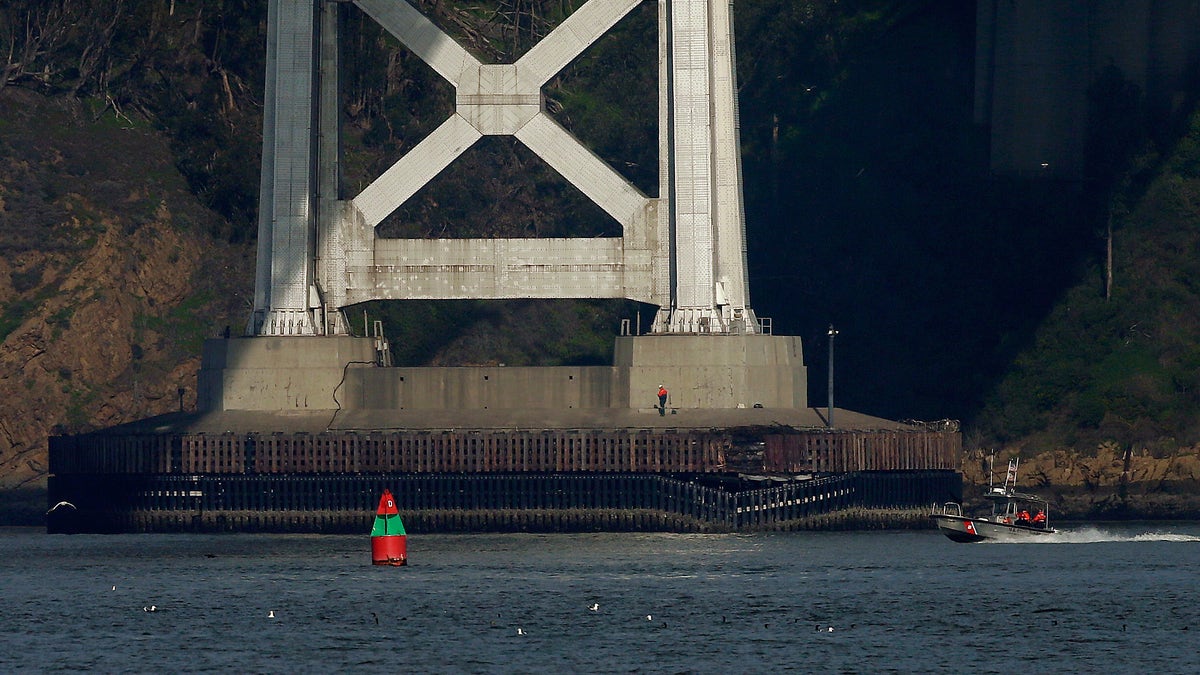
Jan. 7, 2013: A worker inspects damage to the bottom of a tower on the San Francisco-Oakland Bay Bridge in San Francisco. (AP)
San Francisco – An empty oil tanker caused minor damage Monday when it struck a tower in the middle of the San Francisco-Oakland Bay Bridge while navigating beneath the hulking span, officials said.
The 752-foot Overseas Reymar from the Marshall Islands rammed the tower about 11:20 a.m. as it headed out to sea, according to the Coast Guard and state transportation officials. The impact didn't affect traffic on the busy bridge -- the main artery between San Francisco and Oakland, Ney said.
The parent company that owns the ship, OSG Ship Management Inc., said the accident occurred as the vessel hit an underwater portion of the massive bridge structure.
Investigators late Monday had not determined the cause of the crash.
"There's always the human factor," Coast Guard Lt. Cmdr. Shawn Lansing said. "That is again what we'll look into and see whether, in fact, it was a human error or something else and take that into consideration in the development of future regulation."
Visibility at the time of the collision was about a quarter-mile, but officials didn't say if that was a factor.
There was no timetable for completing the investigation, Lansing said. The crew and captain of the ship will undergo drug and alcohol testing, per federal regulations. Inspectors also will examine the hull of the ship above and below water, Lansing said.
The mishap damaged about 30 to 40 feet of fender of steel and wooden timbers built onto the span to absorb the brunt of a ship's collision, said California Department of Transportation spokesman Bart Ney.
The incident brought back memories of a major crash in 2007 that spilled 53,000 gallons of oil into the bay. Oil leaking from the Cosco Busan contaminated 26 miles of shoreline, killed more than 2,500 birds and delayed the start of the crab-fishing season.
The Overseas Reymar was not carrying oil as cargo on Monday, only fuel to power its engines, said Charlie Goodyear, a spokesman for the San Francisco Bar Pilots Association.
Coast Guard authorities said no oil or hazardous materials were reported to have leaked into the water. Still, officials spread 4,000 feet of absorbent material on the water to be safe.
No crew members on the ship were injured, and its hull appeared to suffer some scrapes and minor indentations but was not breached, Goodyear added.
"There's all kinds of speculation as to whether the ship had been pushed into the fender by a strong tide, rather than a head-on collision," Goodyear said. "In comparing this to 2007, this appears to be a much lesser impact."
The crew of the Overseas Reymar reported no loss of steering or propulsion, and initial investigations showed no water leaks from any of the ballast tanks, said Darrell Wilson, a spokesman for OSG.
"The ship's crew safely anchored the vessel and made all proper notifications to the authorities." Wilson said.
California Emergency Management Agency spokesman Jordan Scott said the superstructure of the bridge was fine.
"There is some damage to the vessel, but nothing that poses a danger to anybody," Scott said. "A fire boat is out there to make sure it stays that way, and it should."
The tower of the bridge appeared to be fine from a distance, added California Department of Transportation spokesman Bart Ney.
The tanker docked west of Yerba Buena Island immediately following the crash, and the pilot was being interviewed by both the Coast Guard and the California Board of Pilot Commissioners for the Bays of San Francisco, San Pablo and Suisun, which regulates bar pilots.
State law requires a bar pilot to guide every large vessel -- be it a luxury liner, a billionaire's yacht, aircraft carrier or cargo ship -- in, out and around the San Francisco Bay.
The pilots' role came under intense scrutiny in the crash of the Cosco Busan.
The ship's pilot, Capt. John Cota, served a 10-month prison sentence after pleading guilty to two misdemeanor charges.
The companies responsible for the Cosco Busan paid close to $60 million for the cleanup and in criminal fines.

